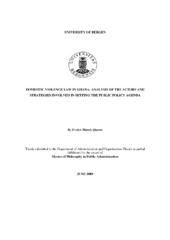| dc.contributor.author | Quarm, Evelyn Mamle | eng |
| dc.date.accessioned | 2010-10-28T09:30:39Z | |
| dc.date.available | 2010-10-28T09:30:39Z | |
| dc.date.issued | 2009-09-01 | eng |
| dc.identifier.uri | https://hdl.handle.net/1956/4288 | |
| dc.description.abstract | Domestic Violence was seen as a private issue in the past in Ghana until the law on Domestic Violence was passed in 2007. However, a research by the Gender Studies and Human Right Documentation Centre in Accra in 1999 showed that Domestic Violence in all its forms is present in Ghana. This thesis attempted to investigate and analyse the various actors and their strategies involved in ensuring the passage of the Domestic Violence Law. In a nutshell, it was concerned with investigating the agenda setting of the domestic violence law in Ghana and how civil society in Ghana positioned themselves and strategized to influence the making of a government policy. Using the models of Kingdon, Kalu and Cobb and Ross, the study sought to develop a model for understanding agenda setting with particular interest in the way NGO’s mobilise support for the issues they carry. Hofstede’s dimension of culture is also used to justify the strategies used by the actors. This work argues that due to lack of material resources, non state actors influenced the agenda setting of the domestic violence law by strategically framing their issues. The hypotheses guiding this research are: The amount of resources at the disposal of actors may influence the mobilization of support for the Domestic Violence Law, strategies that actors pose may influence how far they get their issues on the agenda and the context in which actors find themselves may affect the choice of strategies they may use. The findings from the research study showed that, non state actors were critical in putting the issue of domestic violence on the governments’ agenda and consequently ensuring its passage into Law. Overall, it shows NGO’s can influence how the agenda is set for a particular policy based on how they manipulate resources available to them and how they are able to make use of policy windows to their advantage. | en_US |
| dc.language.iso | eng | eng |
| dc.publisher | The University of Bergen | eng |
| dc.title | Domestic violence law in Ghana: analysis of the actors and strategies involved in setting the public policy agenda | eng |
| dc.type | Master thesis | en_US |
| dc.rights.holder | The author | en_US |
| dc.rights.holder | Copyright the author. All rights reserved | en_US |
| dc.description.degree | Master in Public Administration | |
| dc.description.localcode | AORG350 | |
| dc.description.localcode | MASV-PUBAD | |
| dc.subject.nsi | VDP::Social science: 200::Political science and organizational theory: 240::Public and private administration: 242 | eng |
| fs.subjectcode | AORG350 | |
